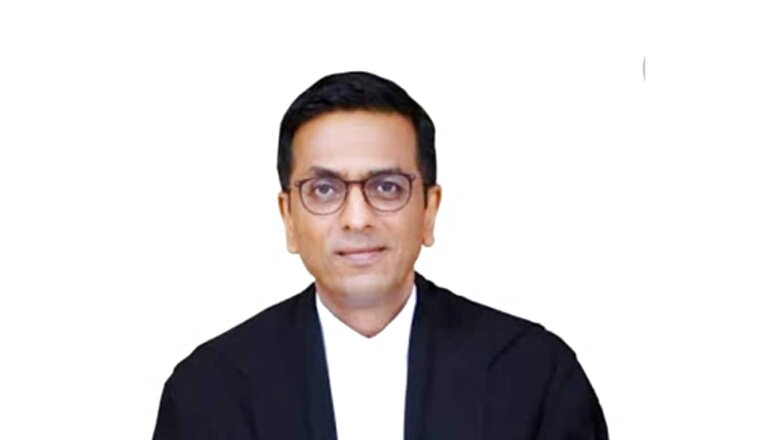
views
Supreme Court judge Justice DY Chandrachud, who took oath as the 50th Chief Justice of India (CJI) on Wednesday, has been part of some of the country’s landmark judgments including the constitutionality of Aadhaar, the right to privacy, Ayodhya title dispute, the Sabarimala case, among others. Chandrachud is set to become one of the longest-serving Chief Justices in recent times, with a term of two years till November 10, 2024. Over the years, he has played a pivotal role in the digitisation of the judiciary.
CJI Chandrachud is seen as an intellectual, well-cultured custodian of the judiciary with a liberal outlook. He has made his opinion known by not only delivering monumental verdicts but with his dissenting opinions on the main judgments. He has passionately championed the vision of a “transformative Constitution” that attempts a “radical transformation of a society which is based on caste and patriarchy.”
However, the plethora of his judgements makes it difficult to club within an ideology. As put by Indian Express in a report – “From his historic dissent in the Aadhaar case, in which he stated that a person’s multiple identities cannot be reduced to a 12-digit number, to the soaring rhetoric of the Bhima Koregaon case, in which he stated that “dissent is a symbol of a vibrant democracy,” to the Hadiya case, in which he stated that a person’s right to choose a religion and marry was an intrinsic part of her meaningful existence. If his stance in the Aadhaar, right to privacy, and Bhima Koregaon cases was lauded as a liberal and progressive voice in the Supreme Court, his stance in the Ayodhya and Arnab Goswami cases was applauded on the other side.”
What Are The Challenges Lying Before Chandrachud
On the judicial front, Justice Chandrachud will face a mountain of cases, a lack of adequate infrastructure, and a delay in the delivery of justice, among other issues. However, based on the experience during the Covid-19 pandemic, it is believed digitisation will receive a significant boost during his tenure.
Another challenge before CJI is the number of high-profile cases pending before the apex court whose outcomes could have far-reaching political ramifications.
Some Of The Important Cases Pending Before The Supreme Court
- Gyanvapi Mosque Dispute: The Supreme Court will hear on Friday a plea to extend the protection of a section of Varanasi’s Gyanvapi mosque complex where a Shivling was purportedly found. The apex court will make a verdict on a petition challenging the Varanasi civil court’s order allowing a videographic survey into the origins of the Gyanvapi Mosque violates the Places of Worship (Special Provisions) Act, 1991.
- Agnipath recruitment scheme: The Apex Court is scheduled to hear petitions against the Agnipath scheme for the armed forces, which was launched by the central government on June 14.
- Distribution of freebies to doctors: In the federation of medical and sales representatives associations of India vs Union of India case, the petition has asked the apex court to direct the Centre to frame guidelines to regulate freebies that are given by pharma companies to doctors.
- Disqualification proceedings against Maharashtra MLAs: The Supreme court needs to decide whether the rebellion within the Shiv Sena led by Maharashtra Chief Minister Eknath Shinde amounts to defection under the 10th schedule of the Constitution.
- National Register of Citizens, Assam: In the Assam Public Works vs Union of India case, the apex court’s verdict will decide whether Section 6A of the Act grants citizenship arbitrarily and if Section 6 A dilutes the political rights of Assamese citizens, among other key issues.
- Constitutionality of the Places of Worship Act: In another pending case, the SC has to make a verdict deciding whether the Places of Worship Act, 1991, which prevents the conversion of places of worship from the religion they were on August 15, 1947, is constitutionally valid.
- Rights of personal guarantors: The top court will hear a petition challenging the validity of the rights of personal guarantors under the Insolvency and Bankruptcy Code.
- Definition of Industry: In the State of Uttar Pradesh vs Jai Bir Singh, the Supreme Court has to reconsider the interpretation of the definition of ‘industry’ under the Industrial Disputes Act, of 1947.
Read all the Latest India News here




















Comments
0 comment